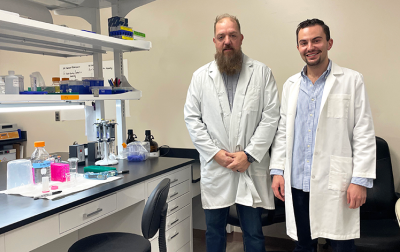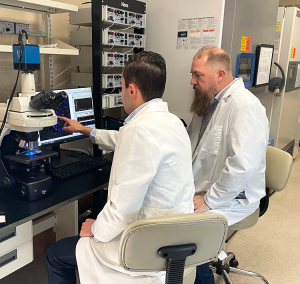The National Science Foundation (NSF) has awarded a significant research fellowship to a graduate student at the Michigan State University College of Veterinary Medicine—the first time a student at the College has been recognized in this way.

Ty Mitchell, a student in the College’s Comparative Medicine and Integrative Biology Program (CMIB), has earned a spot in the 2025 NSF Graduate Research Fellowship Program (GRFP) for his work as a PhD student researcher in the Mast Cell Nexus and Gastrointestinal Stress Biology Laboratory, led by Dr. Adam J. Moeser, Matilda Wilson Endowed Chair.
In 2025, only about 1,500 fellowships were awarded nationwide, which is significantly fewer than the approximately 2,000 in previous years due to reduced federal funding. Because the GRFP usually supports students pursuing research-based PhD or MD/PhD degrees, it is especially rare for PhD students at the College of Veterinary Medicine to receive this award. This highlights both Ty’s accomplishment and the increasing recognition of veterinary research in national science priorities.
“Ty’s achievement is historic for our college,” says Dr. Kimberly Dodd, Dean of the College. “It reflects not only his exceptional scientific talent and perseverance, but also the strength of Dr. Moeser’s leadership in advancing One Health science and training outstanding young investigators.”

Mitchell is training within a program recognized for its pioneering work at the intersection of animal and human health—a key part of an interdisciplinary One Health approach to solving some of the world’s most pressing issues. The fellowship will support Mitchell’s research with Moeser examining how androgen receptor signaling in mast cells affects sex-specific immune regulation. Their work uses advanced genetic and molecular tools to uncover mechanisms that are important across diverse species.
“Ty’s selection as an NSF Graduate Research Fellow is a remarkable achievement and a proud moment for our program,” says Dr. Colleen Hegg, CMIB Program Director. “Ty exemplifies the kind of scholar we aim to attract and support: intellectually curious, driven, and committed to making a difference through science. His success reflects not only his own dedication, but also the collaborative, interdisciplinary spirit that defines our training model. We are thrilled to support his journey and proud to see veterinary research recognized at this national level”.
Moeser’s lab has a strong record of producing nationally competitive fellows, including several NIH F31 Research Service Award recipients. This NSF fellowship is the first awarded to one of his trainees, highlighting the lab’s research and mentoring excellence. Moeser describes Ty as a student with “deep intellectual curiosity, advanced problem-solving skills, and the ability to make significant contributions from the start of his graduate career.”
Previously, Mitchell graduated from Texas Tech University with top honors in animal science with a minor in chemistry, while serving in leadership roles such as vice president of the student senate.
